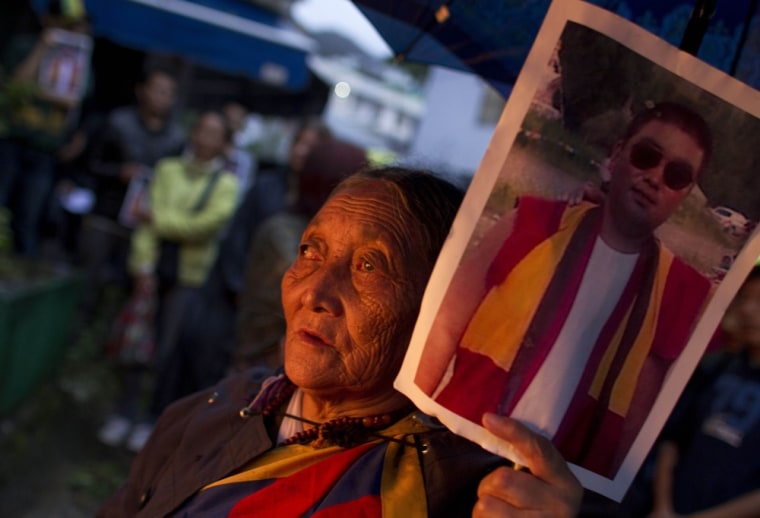A Tibetan Buddhist monk burned himself to death on Monday in southwest China calling for the return of the Dalai Lama, the exiled spiritual leader condemned by Beijing as a separatist, a group campaigning for Tibetan self-rule said.
The monk's self-immolation could spark fresh tensions in heavily ethnic Tibetan parts of Sichuan, which neighbors the official Tibet region, following protests in March when a Tibetan monk there also burned himself to death.
The London-based Free Tibet organization said the latest immolation-protest was carried out by a 29-year-old monk, Tsewang Norbu, who was from a monastery in Tawu, about 150 km (93 miles) from where the last immolation happened.
"Tsewang Norbu drank petrol, sprayed petrol on himself and then set himself on fire," Free Tibet said in an emailed statement, citing an unnamed witness.
"He was heard calling out: 'We Tibetan people want freedom', 'Long live the Dalai Lama' and 'Let the Dalai Lama Return to Tibet'. He is believed to have died at the scene," the group said.
China's official Xinhua news agency also reported the monk's self-immolation, but said "it was unclear why he had burned himself."
Tawu, called Daofu in Chinese, is in a largely ethnic Tibetan part of western Sichuan that many advocates of self-rule say should form part of a larger homeland under Tibetan control. Calls from Reuters to the government and police bureau in Daofu County went unanswered on Monday evening.
Tensions over the fate of the exiled Dalai Lama and his calls for Tibetan self-determination have continued to dog the region, sometimes flaring into protests.
In March 2008, Tibetan protests led by monks in Lhasa, the regional capital of Tibet proper, were suppressed by police and turned violent. Rioters torched shops and turned on residents, especially Han Chinese, whom many Tibetans see as intruders threatening their culture.
That unrest spilled over into other ethnic Tibetan parts of China, including mountainous western Sichuan.
Beijing has repeatedly accused the Dalai Lama of being a separatist who has abetted violence. China also rejects accusations of oppression of Tibetans, saying its rule has bought huge benefits to what was a dirt poor society.
The Nobel Peace prize-winning Dalai Lama denies seeking independence for Tibet, saying he wants a peaceful transition to autonomy for his remote mountain homeland, which the People's Republic of China has ruled since troops marched in 1950.
Security forces detained about 300 Tibetan monks from a monastery in western China for a month amid a crackdown sparked the previous self-immolation, two exiled Tibetans and a prominent writer told Reuters at the time.
"Today's news exposes how desperate some Tibetans feel," the director of Free Tibet, Stephanie Brigden, said in the group's email.
After the self-immolation in March, she said, Chinese authorities "deployed troops on to the streets, imposed curfews, undertook house searches and set up military round blocks."
